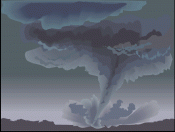Gov. Haley Barbour has proclaimed the week of Oct. 24-28 as Tornado Awareness Week in Mississippi.
Every year tornadoes pose one of the biggest threats to our state. The month of November sees the second highest average number of tornadoes annually in the state of Mississippi.
Tornadoes spawn from powerful thunderstorms and can cause deaths and devastate neighborhoods in seconds, sometimes with little to no warning. Between 1950 and 2010, Mississippi was struck by 226 tornadoes in the month of November, according to the National Weather Service compared to April which has seen 274 tornadoes for the same time period.
The National Weather Service will conduct a statewide tornado drill at 9:15 a.m. Wednesday, Oct. 26. The NWS will use the Routine Weekly Test on NOAA weather radios to simulate an actual tornado warning. All local emergency managers, schools, businesses and residents throughout the state are encouraged to participate in this drill.
"While our past few springs have been very active with a record number of tornadoes it is important for all of our residents to know what they will do at any time during a tornado event," said Mississippi Emergency Management Agency Director Mike Womack. "Last spring 37 people were killed during tornado outbreaks in our state but our goal each year if to not have any fatalities."
A tornado appears as a rotating, funnel-shaped cloud that extends from a thunderstorm to the ground with whirling winds that can reach 300 miles per hour. Damage paths can be in excess of one mile wide and 50 miles long. Mississippi averages 28 tornadoes and seven deaths per year since 1950, according to the weather service.
"While we have made great strides in tornado forecasting and warning lead-time taking proper safety actions is still the responsibility of our residents," said Meteorologist in Charge Alan Gerard. "Knowing what to do when a tornado warning is issued will save lives."
The following are tornado safety tips to remember all year long: Monitor a NOAA weather radio for the latest information. These radios can be purchased at most major retailers. Communities will be alerted to a tornado warning either through radio and weather stations or by a warning siren.
In case of a tornado warning, take cover. Avoid windows and go to the lowest floor if possible. Cover yourself with blankets or a mattress to protect from falling debris. If not at home, go to an enclosed windowless area, crouch down and cover your head. If in a car, get out and seek shelter. If no shelter is available, lie flat, face down on low ground and protect the back of your head with your arms. Do not panic.
For more information, contact MEMA External Affairs at 866-920-MEMA (6362), or visit us online at http://www.msema.org. You may also visit the National Weather Service for more weather related information at http://www.srh.noaa.gov.



Comments
Use the comment form below to begin a discussion about this content.